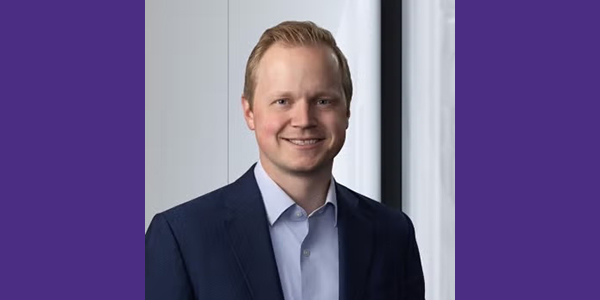PharBE alumnus and Perkins Coie patent attorney Jake Gober helps clients make the most of their intellectual property portfolios and comes back to the Department of Bioengineering every year to lecture on ‘Patents 101.’
As a masters student in the Department of Bioengineering’s Pharmaceutical Bioengineering (PharBE) program in 2017 and 2018, Jake Gober found the frequent guest lectures particularly valuable.
“You were hearing specialized perspectives from working professionals who were experts in their respective fields,” he said. Other professionals were at his side in the classroom as well. Many in the program, then and now, work full time while completing the program. PharBE students come from a variety of companies and backgrounds including industry leaders like Abbvie, Amgen, Bristol Myers Squibb, Lilly, Merck, Moderna, and Roche, as well as startups like Maze Therapeutics, NextCure, and Regenxbio.
Collectively, the students and guest lecturers not only gave him a view of those specialized skills, but also how those skills translate into helping build successful companies within the life sciences industry.
“The [PharBE] program is great because you not only expand your technical expertise, but you also expand your knowledge of how companies transform R&D into commercial products through the lens of the drug discovery and development process.” – Jake Gober
That broad view has been crucial to Gober’s success as a patent attorney at the Seattle-based international law firm Perkins Coie. There, he helps clients within the biotech and medtech industries develop and protect their core innovations as well as identify and mitigate intellectual property risks.
“Advising clients on intellectual property and patents starts by understanding the client’s technology and business,” Gober said. “It would be easy to say you should patent every invention, but that’s expensive and would not align with most clients’ objectives. So you have to first understand the client’s business and technology to understand where expanding the clients’ patent rights would help build company value and support its success.”
Gober earned his law degree and PharBE degree simultaneously, having previously received a bachelor’s degree in neuroscience at the University of Washington.
“I came in [to the PharBE and law programs] knowing that I wanted to be a patent attorney, and it’s what I’m doing. My goal within the program was to deepen my technical expertise, and it did that and more. The PharBE’s focus on the drug development process from identifying drug candidates to FDA approval was strong, and it’s been immensely useful in the job,” he said.
“I wanted to build as much know-how as possible, [so] I could not just be a legal advisor but truly understand the science and the business.”
For the last five years, Gober has been sharing that know-how, as well as his legal expertise, with students in the PharBE program. It turns out he not only enjoyed those guest lecturers but that he also enjoys being one of those guest lectures. He gives a “Patents 101” lecture annually.
“When Jake was a student, I gave those lectures on IP and patent protection, though I am not a lawyer. So once he graduated, I recruited him to give those lectures, as that is what he does for a living,” said Professor Robbie Wong, who is director of the PharBE program. “He has a great background and can advise clients on how to protect their invention. I try to bring in experts who are actually doing the job, which gives students an excellent foundation in a particular area.”
“It’s fun to see the new cohorts of students coming through” as a guest lecturer, Gober said. And so is the job itself.
“As a patent attorney, I get to work at the forefront of science and technology and see such a wide array of innovative technologies. It’s an exciting and rewarding career.”



